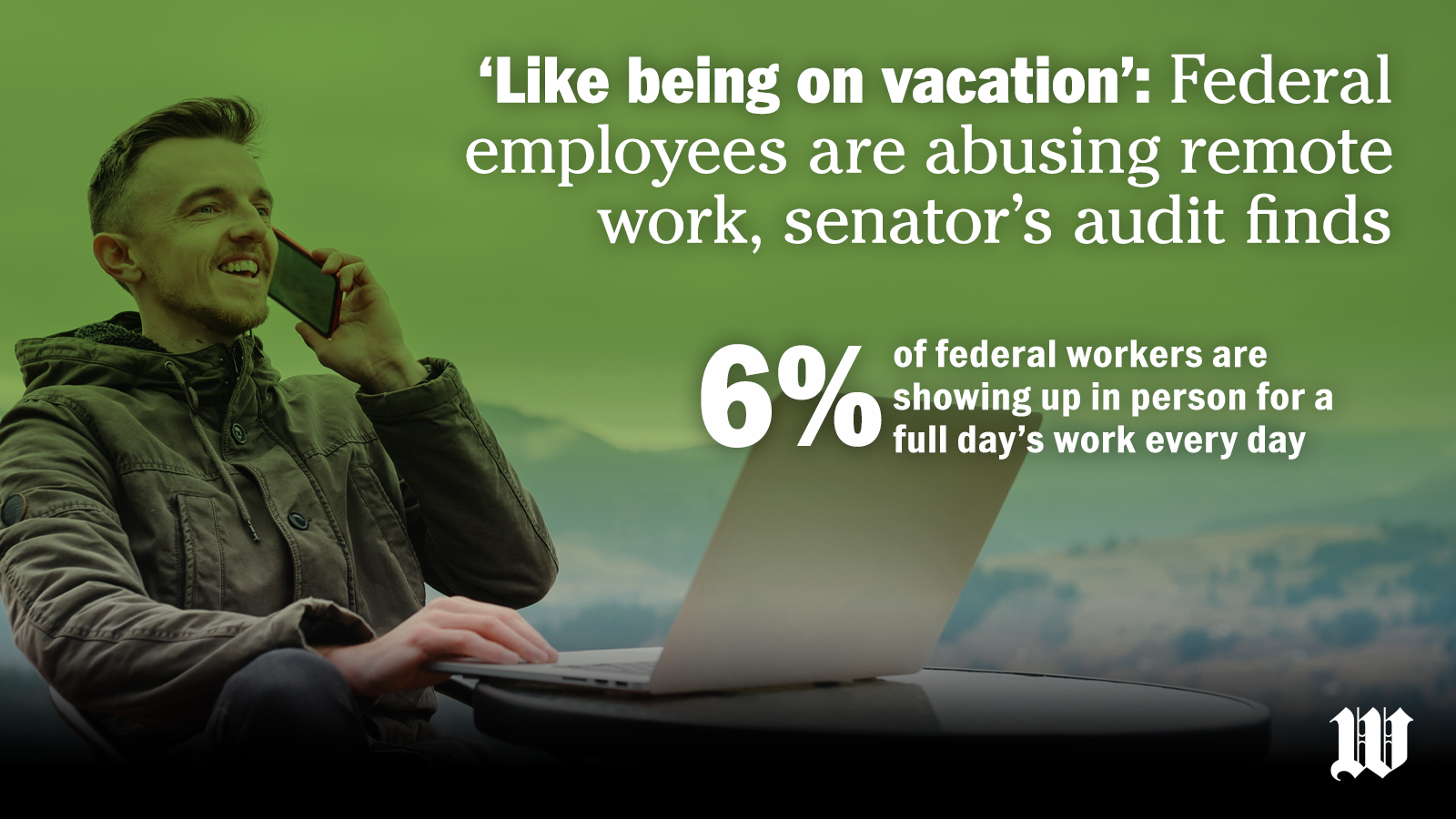Telework has become a bit of a feds-gone-wild situation under President Biden, according to a new Senate report that says government workers have been caught taking bubble baths, drinking and driving or getting medical treatment — all while they were supposed to be on the clock.
Just 6% of federal workers are showing up in person for a full day’s work every day, according to Sen. Joni Ernst, an Iowa Republican who has been studying the issue.
Meanwhile, one-third are remote employees, and they’re often soaking colleagues and taxpayers with their on-the-job antics.
One Social Security employee ran his side business while he was supposed to be doing telework. Ms. Ernst said that employee had his mother and his wife access his Social Security computer system to record time on duty and cover for the fact he was running his business.
In a now-famous case, a Veterans Affairs worker logged in for a meeting from a bubble bath.
And a Housing and Urban Development employee drank and drove during the workday and got paid for the time she spent in an Oklahoma jail, Ms. Ernst said, citing a whistleblower.
She said one Agriculture Department employee told her that colleagues saw working from home as “like being on vacation.”
“Very little work was assigned, and all they had to do was be available by phone,” that food inspection service employee said.
The no-shows have emptied out federal buildings, leaving the government to ponder what to do with the vacant offices. However, agencies are reluctant to give up their space.

Officials justify their decisions by saying they want to be prepared in case the workers come back, but government investigators said the agencies are often just as worried about losing prestige if they give up real estate.
Ms. Ernst said the generous telework policies are in place even as Americans struggle to reach government employees.
She pointed to reports from veterans who said their calls for mental health appointments went unanswered.
One soldier who worked on Black Hawk helicopters for the Army spent years trying to schedule appointments. When he finally got a therapist, she “spent the appointment singing the praises of remote work with her cat draped around her neck,” the senator reported.
She also said she’s heard complaints about Iowa constituents who couldn’t get Social Security on the phone — even as the agency’s commissioner told her that Iowans were getting some of the best service in the country.
“I shudder to think what may be happening elsewhere,” Ms. Ernst said in her report.
She said there’s even become a perverse arms race among agencies to offer the best remote work policies. Social Security said it was struggling to compete with the Veterans Affairs Department, which was recruiting away employees by offering better telework opportunities.
“While teleworking may be allowing VA employees to live their best lives, it’s a disservice to the vets the department exists to serve,” Ms. Ernst said.
Her report comes as the incoming Trump administration looks for places to trim the budget.
President-elect Donald Trump has tapped Elon Musk and Vivek Ramaswamy to run the Department of Government Efficiency to power through reforms.
Ms. Ernst is leading a Senate caucus aimed at cooperating with that new agency.
Mr. Musk took to X, his social media platform, to highlight Ms. Ernst’s finding that just 6% of employees show up full-time every day.
“If you exclude security guards & maintenance personnel, the number of government workers who show up in person and do 40 hours of work a week is closer to 1%” he said.
Ms. Ernst said savings can be had if the government looks for them.
Even as offices are left empty, the government continues to buy furniture, at about a billion dollars a year, according to OpenTheBooks.com, a watchdog.
Ms. Ernst said the government needs to rethink its approach, including a use-it-or-lose-it attitude toward real estate.
She also called on agencies to forgo the blanket telework agreements they’ve pursued and require case-by-case determinations, with oversight and follow-up to make sure work is getting done.
The senator said bright signs do exist, with a recent sale of a federal building in Orange County, California. But she said that’s rare.
When the General Services Administration put the building up for sale with historic preservation restrictions, it got no takers on the $70 million price.
Ms. Ernst said the lesson for the government is to quit tying things up in red tape.
• Stephen Dinan can be reached at sdinan@washingtontimes.com.




Please read our comment policy before commenting.